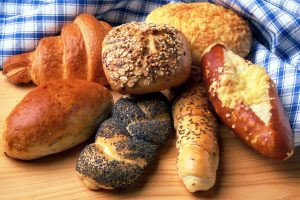 Dear ______:
Dear ______:
Just a short note today, as I’m under the weather. I’ll spare you the interruptions for hacking and wheezing.
As I was saying, the “modifiers” in the various lines of the uber-familiar Lord’s Prayer make all the difference to its meaning.
Noticing these little in-betwen bits is especially helpful if you are going to go beyond the rote recitation of the prayer Christ taught his disciples. (And you should — Luther has a ton to say about it, as you may know from my book Kneeling with Giants: Learning to Pray with History’s Best Teachers.)
Last time I was pondering the line “Thy will be done, on earth as it is in heaven.”
Let me say a word or two about “Give us this day our daily bread.”
The core of this line is a personal request:
Give us bread!”
I’ve always found in this a clear word to all the over-humble souls who boast that they will pray for others but would never ask anything for themselves. Since Jesus actually commands us to pray for our own bread, not doing so is clearly a mistake.
But there is more in the modifiers.
Give us this day our daily bread
- We pray for “daily” bread.
- We pray for bread for “this day.”
Note the contrast to any greedy pseudo-Christian prayer that aims at wealth. We are not, with apologies to Marie-Antoinette who, it seems, never actually said “Let them eat cake,” praying for fancy food, or rich food.
- We aren’t called to pray for a full pantry, fridge, and chest freezer, to be the fully-equipped home chef.
- Nor are we praying for vast bins of dry-goods and bottled water stocked up for the apocalypse.
Jesus’ invitation, his instruction, is much simpler:
- We pray to be nourished. We pray for enough food to live and be healthy.
- And we pray for it one-day-at-a-time.
Every day we are reminded by Jesus that every blessing, even food, comes from his generous and loving hand.
We may think first that our food comes from money we earn, spent at a shiny supermarket. Praying the Lord’s Prayer reminds us that our job is a gift, the food is grown by the hard labor of farmers, and it comes to us through further labor of many others who bring it to the shelves and run the store.
We are all dependent on God for each day’s bread. And God’s way of bringing it to us shows how dependent we are on each other.
It is all about gratitude, my friend, and living moment by moment trusting our good and generous God rather than ourselves.
Blessings,
Gary
————
Prayer classes upcoming…
I’m contemplating offering a “Pray Like a Reformer” online class for later this year. If you are interested in hearing about it, click here to get on the waiting list for my prayer courses. That’s the way to be sure you get info by email.
————
And on the topic of prayer courses, Lent is coming very soon. I’m aiming to offer my “Focus on Prayer” class for the third Lent in a row. It is a really fun way to help make Lent a time of spiritual renewal, exploring three classic approaches to Christian prayer.
We’ll be using three chapters of my book Kneeling with Giants, one Protestant, one Catholic, and one Orthodox. If you want me to email you when registration opens, click the button and get on the waiting list.
————
This post contains an affiliate link to Amazon. That means if you click though to buy my book there, I’ll get a wee small commission.

“Jesus’ invitation, his instruction, is much simpler:
We pray to be nourished. We pray for enough food to live and be healthy.
And we pray for it one-day-at-a-time.”
There is a nice echo here of the Israelites and their wilderness experience — how they gathered manna each day, just enough to get by, warned by God not to hoard even as Sabbath approached.
Of course, the Israelites also feared starvation in the wilderness, which leads me to this question: What meaning does the Lord’s Prayer take on in a time of famine? How do Christians in other parts of the world where famine has been a reality pray this prayer?
Thanks, Gary. (The tech folks can’t figure out why your comments get stuck in moderation. They will eventually find a fix. Sorry…)
I think the connection to the Israelites and their manna is right on target. Perhaps it was in John’s Gospel when Jesus said he himself was the bread of life, he made the contrast to manna explicitly. Here where physical bread is the subject, it is instead a parallel, and I suspect Jesus intended it.
As to praying for daily bread in time of famine, I think it does not point to a problem, but the extreme essence of the prayer. It is the horribly poignant reality, where people are forced to pray for and search for each day’s sustenance — and surely receive it with all the more gratitude to God for another day’s survival.
If we can only ask for our daily bread in times and places of abundance I wonder if we are doing it right.